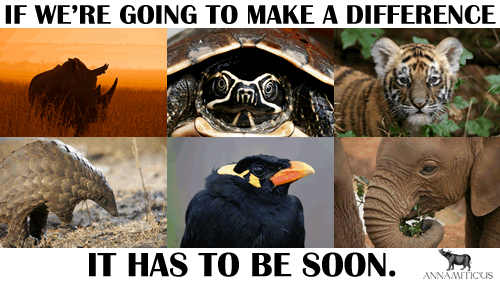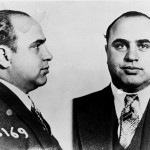
Several species are approaching what conservationists call the ‘tipping point’, i.e. that number in their populations where natural births cannot replace offtake from poaching or the numbers are so limited the species is no longer genetically viable. That, in and of itself, presents a case for urgent responses but that is not what is on my mind today.
When I first began work against international wildlife trafficking, one of the major hurdles to overcome[i] was convincing the ‘mainstream’ law enforcement community that crimes targeting fauna and flora were worthy of their attention. It wasn’t easy.
However, progress was made and I saw wildlife crime creeping onto, and up, the agendas of more and more Customs- and Police-related meetings. But then the attacks of 9/11 occurred and we basically stepped back a decade.
Today, wildlife crime has a level of political attention that I, and my colleagues in CITES, INTERPOL and the World Customs Organization in days gone by, could not possibly have imagined, let alone dreamt of. The level of law enforcement priority is still lagging behind but it is vastly better too.
I do not wish to be some prophet of doom, but we all know that ‘a week is a long time in politics’. And there is an awful lot occurring in the world to draw attention away from what is happening to elephants, pangolins, rhinos, tigers, etc. and those whose daily task it is to protect them and their habitats. There are terrible feelings of déjà vu and concern building inside me at the moment. Not just because I once saw attention disappear almost overnight but also due to the fact that, having been responsible during my career for managing Police resources, I know what it means to determine priorities. I sincerely hope my worries are unwarranted.
Allow me to describe a few scenarios and then pose questions.
For the first time in my memory, the European Union’s Wildlife Enforcement Group recently met other than in the Commission’s premises in Brussels. Impressively, delegates gathered together instead in the headquarters building of Europol, in The Hague. Following the recent terrorist atrocities in Paris, how likely is it that Europol will be able or willing to host such an event again; at least in the foreseeable future?
INTERPOL and the United Nations Environment Programme have just completed a joint conference[ii] at the former’s new complex in Singapore. According to the press release, over 140 experts, 50 countries and 20 organizations attended. Post-Paris, is there likely to be a reluctance on the part of managers and budget-holders to fund further participation at such events?
A good deal of effort is being put, at present, into making airport security personnel aware of wildlife smuggling. Following the apparent insertion of an explosive device onto a Russian aircraft leaving Sharm el-Sheik, what do you imagine the focus of screening and searches will be?
Border control officials, especially around the Mediterranean, are close to being overwhelmed by migrants seeking to reach mainland Europe. Where possible, they are trying to identify, and respond to, human smuggling and trafficking. Given the allegations that terrorists are mingling with migrant groups, where will their attention turn? And what priority, if any, will be allocated to spotting fauna and flora couriers?
Financial intelligence units are being encouraged to seek out the profits from wildlife trafficking and to target money-laundering associated with it. How far down the list will a request for assistance from a wildlife agency now be placed?
Mali is one country where elephants are not far from the tipping point. Given what happened in its capital this week, will national or elephant security be debated by its decision-makers?
I am not aiming to be cynical. Or, in any way at all, suggest that counterterrorism must get anything other than the highest possible priority. My goal is to be realistic.
The focus on wildlife crime may have reached its peak. Now is the time to exploit that to the fullest extent possible.
I suspect many areas of specialized law enforcement are about to have resources deployed elsewhere.
For example, if I were a senior British Police officer and had been tasked (as many will have been) in considering how best to respond to a Paris-type terrorist attack, I would probably be at my wits end at the moment. The UK simply does not have enough officers trained in the use of firearms to cope; certainly not if there were multiple incidents, in separate locations, each requiring cordons, follow-up raids, long-term increased security, etc. If I know this, you can bet most terrorist cells in the world are aware too. If I were asked to allocate resources to combat wildlife trafficking, would I? No.
Many countries in the world have Police officials who are constantly armed. Several have enforcement agencies that are very paramilitary in nature. But do you think the head of France’s Gendarmerie feels particularly reassured by that today or under any less pressure to respond to his President’s call for a war on terror?
There isn’t someone on every street corner of Ha Noi offering rhino horn for sale. Most bars in New Delhi do not contain a criminal peddling tiger skins. Despite what some might have you believe, there are not queues of customers at outlets, legal and illegal, selling ivory in Guangzhou.
If we pooled our knowledge, we could probably identify many of the significant players controlling, and profiting from, the ongoing rape and pillage of our planet’s natural resources or at least find ways to pinpoint them.
In the realm of priority-setting, those combating wildlife crimes must use every asset, human and technological, in the most effective way.
Press releases I have read in the past few days, when referring to environmental crime, have spoken of ‘roadmaps’, ‘strategies’ and ‘calls to action’. It is more than a year since the Secretary-General of CITES said this:
“Ultimately this fight will be won or lost on the front lines, whether in the field, the courtroom, or the market place – not in a conference room. We have had a lot of important high-level events over the past three years and we must now better focus our collective efforts on local, national and regional actions.”
It did not take much reading between the lines to wonder whether John Scanlon was feeling some impatience and frustration when he used those words. I wonder whether he is more, or less, frustrated today? Especially as conferences continue to be convened and even more are planned. Politicians, diplomats and international civil servants inevitably get swept along by, or caught up in, the swirl of events and the fine words that emerge. There is no such excuse for the law enforcement community.
On 30 December 2014, I expressed the hope that things might appear more encouraging by the end of 2015[iii]. As I look towards 2016, I think matters may be about to get much worse. Yes, it is essential that life should go on as normal, if we are not to be cowed by terrorism. But effective responses to organized wildlife crime have not yet become ‘normal’ or routine.
A window of opportunity creaked opened a few years ago for those who want to bring wildlife criminals to justice.
It could come crashing down at any moment.
[i] http://www.whittlespublishing.com/The_UNs_Lone_Ranger_Combating_international_wildlife_crime
[ii] http://www.interpol.int/News-and-media/News/2015/N2015-194


![The UN’s Lone Ranger: Combating International Wildlife Crime [Podcast]](https://annamiticus.com/wp-content/uploads/2015/10/BehindTheSchemesEpisode37-500px-150x150.png)

